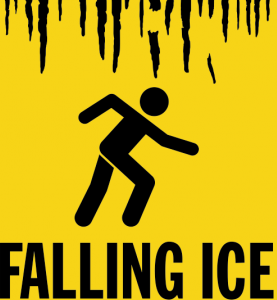Winter is here! And with the holiday season comes the hazards of harsh winter weather. According to the federal Bureau of Labor Statistics, 42,840 people were injured on the job by ice, sleet or snow in 2014. So, what are your obligations as a business owner or landholder for those kinds of injuries on your property?
Let’s start with the basics. In general, as a business, you’re required by property law to protect your guests against hidden hazards on your property. The details will vary depending on your local laws, so check with an attorney if you have any specific questions. These are the hazards which aren’t open and obvious, and which can’t be detected by ordinary inspection of the property. Classic example of hidden hazards in this category are a broken stair, or a slippery floor. For you to be liable, you either have to have (a) created the dangerous condition, or (b) known (or you should’ve known) that the hidden hazard existed, and failed to warn your guests.
This requires a little explanation. With snow, sleet or ice, to have “created the dangerous condition” doesn’t mean that you’re a wizard with the power to control the weather. Rather, it means, for example, that you or your contractor did a poor job of clearing snow buildup. (And many places, like New York City, make property owners responsible for clearing snow accumulation in front of their buildings, and you should follow your local laws.) Or, alternatively, it’s a hazard you knew existed, and didn’t do anything about or warn people about. For instance, if you know that black ice tends to build up on your property, you should probably put up a sign warning of potential black ice.
That said, you do have some recourse if you do get sued. The standard defenses are pretty straightforward. First, it might be that the storm isn’t over yet. No one expects a person to go outside in the middle of a storm to shovel snow, and the law generally reflects that. When it stops, though, you should probably get on it! Second, you could argue it was a condition that the injured person should’ve known about or noticed. A two-foot pile of snow, for instance, is hard to miss for the average person. Third, you could argue that you didn’t realize the danger existed in the first place.
Of course, it never hurts to be prepared! SmartSign has a full line of snow and ice warning products available, at the lowest prices, guaranteed.
